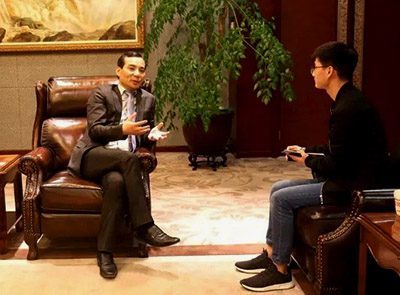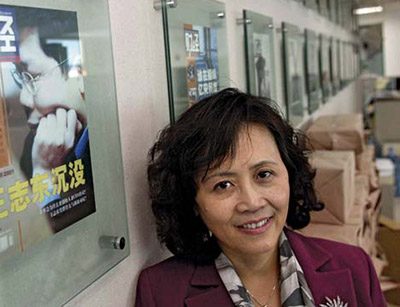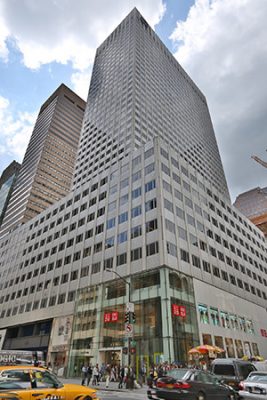
Anbang’s Wu Xiaohui gave a rare interview last week as the company launched a PR blitz
Anbang Insurance this weekend lashed out at media accounts of legal and financial crises at the high profile Chinese investor, threatening lawsuits while denying accounts of cashflow struggles and chairman Wu Xiaohui’s detention by authorities.
Anbang, which leapt onto the world stage in 2014 with its $1.95 billion acquisition of New York’s Waldorf Astoria Hotel, announced on its website on April 29th that it would be filing a lawsuit against Caixin and its editor, Hu Shuli. The threatened legal action came on the same day that the widely respected mainland news site published an account indicating that Anbang had violated financial regulations and concealed the nature of its finances.
On April 27th, Caixin had reported on a cash exodus of RMB 24.8 billion ($3.5 billion) from Anbang’s life and property insurance subsidiaries in the first quarter, and reports had circulated widely on Chinese social media that Wu Xiaohui had been detained by mainland authorities.
Anbang, which followed its Waldorf Astoria deal with a series of high profile acquisitions, has seen several of its proposed deals fizzle over the last year, including a failed attempt to reportedly invest $400 million in a project owned by the family of Donald Trump’s son-in-law and senior advisor, Jared Kushner.
Anbang Implies Blackmail by Caixin

Hu Shuli’s Caixin is one of China’s most respected publications
In Anbang’s Saturday announcement, it accused Caixin of personal attacks on Wu, including making false reports of the Anbang chairman’s divorce from his wife, Zhuo Ran, who is a grand-daughter of former paramount leader Deng Xiaoping. An earlier New York Times account had tied much of the funding for privately held Anbang to the Deng family and other members of China’s political elite.
Anbang said that it was preparing a legal case against Caixin and Hu, for damages to the company’s business and to Wu’s personal reputation. In its announcement Anbang stated that the accounts by Caixin had come after Anbang declined to buy advertising and sponsorship from the media firm.
In a separate announcement on its website on Friday, Anbang had threatened legal action against unnamed parties who had published accounts on social media saying that Reuters was reporting on Wu’s detention by authorities.
Our Chairman Absolutely Never Disappeared
The legal moves follow an Anbang PR offensive late last week after reports of Wu Xiaohui’s detention by mainland authorities spread from the Hong Kong and Taiwan media onto China’s WeChat social network. Widely shared accounts from Hong Kong’s Apple Daily and other outlets popped up across group chat and personal messages even more quickly than WeChat’s army of censors could pull down posted stories.
Wu, who rarely talks to the press and has seldom been photographed, gave an in-person interview published last Thursday in a newspaper controlled by the propaganda department of Beijing, which was syndicated widely in the mainland press. The media blitz followed rumours that Wu, who built Anbang into one of China’s biggest corporations in just over a decade, was being held for questioning by government agents investigating Xiang Junbo, China’s chief insurance regulator, who was detained in mid-April for “severe disciplinary violations” – the party’s euphemism for corruption.
Chinese regulators have recently turned their attention to the country’s rapidly growing insurance industry, as President Xi Jinping attempts to stamp out corruption and prevent asset bubbles that could threaten stability. While much of Anbang is at least nominally owned by rural villagers said to have ties to Wu Xiaohui and his family, the insurer quintupled its capitalisation in 2014, largely through injections of billions of dollars of cash from its network of shareholders, the New York Times reported.
The accounts of Wu’s detention may sound familiar to Fosun chairman Guo Guangchang. The head of the mainland investment conglomerate was pulled out of the Shanghai airport by police in December 2015, and disappeared for several days. Guo has said little about his experience with the authorities, but several sources have reported that he was detained to ensure his full cooperation with a government investigation of Shanghai officials who had fallen afoul of Xi’s anti-corruption putsch.
RMB 24.8 Billion Flees Anbang as Customers Pull Deposits

Anbang pulled out of a deal to finance Kushner’s 666 Fifth Avenue
While Anbang threatens retaliation, the company’s accounts are already showing the damage caused by its declining reputation and increasing regulatory scrutiny.
As China encouraged the growth of its insurance industry in recent years and pushed companies to make overseas acquisitions, Anbang grew into the country’s third largest insurer reportedly by selling equity to wealthy individuals and through sales of high yield wealth management products packaged as insurance.
Now China has put an end to sales of short-term, high-yield insurance products, and there are signs that investors are pulling cash out of the once high-flying insurer. Anbang’s life insurance subsidiary reported a cash outflow of RMB 5.7 billion in the first quarter of this year, according to Caixin, and the situation for the company’s property insurance division was even worse, with RMB 19.1 billion heading out for the exits in the same period, according to financial results published on Thursday.
The outflows are said to be due to policy cancellations and withdrawals by clients, at the same time that Anbang’s sources of new capital dried up. That performance represented a rapid reversal from 2016 when Anbang averaged net cash inflows of nearly RMB 10 billion per quarter.
Financial Struggles Follow Failed Deals
If Wu used his Waldorf Astoria acquisition to promote Anbang as a global player, the company’s recent string of failed deals have exposed the limits of Wu’s influence and Anbang’s deal making prowess.
In late March Kushner Companies announced that its talks with Anbang for a stake in its planned $7.5 billion redevelopment of 666 Fifth Avenue had ended without a deal, apparently ending any hopes of Wu establishing direct business links with the Trump administration.
That failure was widely blamed on Chinese regulators reining in “irrational acquisitions” as the country attempt to cut back on capital outflows.
Then just two weeks later, Anbang’s attempted $1.6 billion acquisition of US annuities and life insurer Fidelity & Guaranty Life, which began in late 2015, fizzled after the Chinese company’s financial reporting failed was said to fail to meet the needs of US regulators scrutinising the deal.
Wu’s rapid accession to the world stage had hit its first major speed bump just over one year ago, when Anbang mysteriously withdrew its own $14 billion bid for Starwood Hotels and Resorts. The company has yet to explain its rationale for dropping its pursuit of the international hotel brand, which was eventually acquired by Marriott for $13 billion.
Leave a Reply